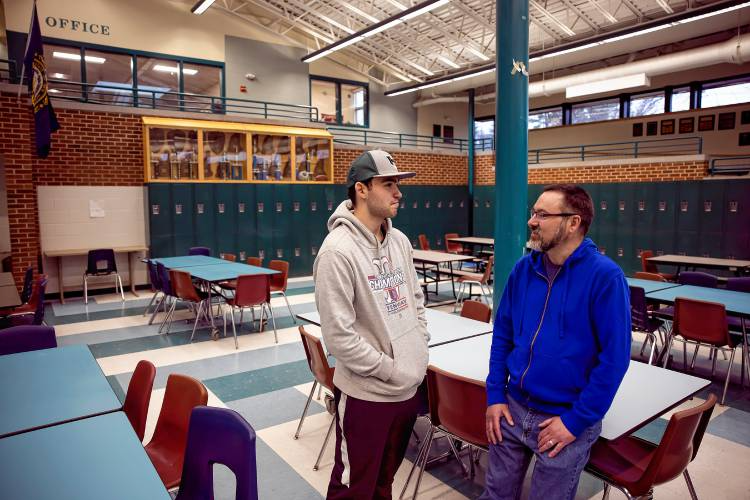By Phoebe McPherson, Managing Editor
On Tuesday, University of New Hampshire President Mark Huddleston ended his State of the University address early for the first time.
With an extra 40 minutes, he allowed for a town hall meeting where he fielded questions without a prepared speech. Before he delivered his speech, Huddleston explained the open question and answer session to the audience, and encouraged community members to submit questions via email or social media with the hashtag #unhsotu.
Members from the Student Environmental Action Coalition (SEAC) were present to get answers as a part of their ongoing divestment campaign.
Huddleston seemed transparent and honest, adding that these answers were his personal opinion. It was especially evident in the responses to SEAC members who came searching for answers as to when the university was going to divest from fossil fuels.
“You, I, everyone in this room uses fossil fuels everyday and we will for generations to come,” President Huddleston said. “Divesting totally from fossil fuels is not the right answer.”
SEAC member Giselle Hart would later admit feeling let down over Huddleston’s response.
“You know it was discouraging…for the president to point out the inevitabilities of a fossil fuel economy,” she said. “To me, that isn’t exactly forward thinking.”
The road to making UNH a fossil fuel-free institution began back in 2012. The student activist group joined a nationwide campaign to try and convince higher education presidents, boards and deans to divest from fossil fuel usage at individual institutions.
SEAC member Griffin Sinclair-Wingate pressed Huddleston with facts and figures.
“Research from UNH’s own net impact and the Independent Petroleum Association of America has shown that fossil fuel free portfolios are performing just as well as portfolios invested in fossil fuels — and I know you take a lot of pride in the sustainability of the university — so why profit from fossil fuels when you can profit just as much from sustainable investments,” he said, reading from a notecard.
The answer seemed to be a case of ‘he said, she said.’ Huddleston acknowledged the study, but countered with a New York Times article from Feb. 9, 2015, “Study claims oil divestiture may hurt college endowments,” which he said claimed the opposite to be true from Sinclair-Wingate’s notion.
This conversation came just days after the Feb. 13 Global Divestment Day when SEAC members marched across campus to remind the administration of their requests.
“The conversation is changing,” Hart said. “Two years ago, when SEAC had their first divestment campaign [two academic years, the campaign began in 2012], divestment was a really radical idea.”
Huddleston seemed relaxed enough with other questions as well, making jokes about the snow and his shared wishes for the future of the university.
UNH professor of communication James Ferrell asked when UNH will cease “limited resource” spending on “administration, branding and marketing, football stadiums and dining halls,” and instead work on academic buildings that are in desperate need of renovations.
Huddleston agreed with tweeters — or twits, according to him — that Kendall Hall, Conant Hall and Spaulding Life Sciences Center are long overdue for renovations. He also revealed that the only thing that the University of New Hampshire asked for from state funding this year was $38 million dollars to fix “deficiencies” of the aforementioned buildings.
Also via Twitter, a UNH-Manchester colleague wanted to know what is being done to integrate the three campuses that make up the institution.
Whether that is feasible in the foreseeable future or not, Huddleston had the answer: He wants a bus system that will run between the three campuses all day.
“We have the biggest transit system in the state, but I can’t get my bus going from Concord to Manchester to Durham … I’m going to stay around long enough until I can get a bus running,” he said. “Even if I have to drive it myself.”
While some questions had been submitted in advance via email and social media, a few came from a — perhaps shy — audience when hoards of hands failed to fly into the air throughout the event.
An unnamed student asked about professor Edward Larkin’s return to campus after his 2009 dismissal for indecent exposure. She labeled him as a sex offender, which Huddleston corrected.
“I don’t think there was registration in that case,” he said, answering carefully that the university attempted to avoid the situation but was ultimately directed to bring Larkin back.
One woman asked the president to look back at the past seven years and talk on his proudest achievements.
(Kind of) jokingly he responded, “survival.”
Student Body President Joe Sweeney said over the phone that he “applaud[s] [Huddleston] for the effort” of the town hall meeting.
“For him, it was an interesting scenario,” he said.
Sweeney added that he doesn’t expect any deflation in the divestment campaign efforts after Huddleston’s rebuttal to SEAC.
“We just wanted to make sure that divestment was something that was brought up,” Hart said. “Just to show that it’s something students are interested in, and that we care about UNH’s moral integrity as well as financial integrity.”
As the final speaker during the town hall meeting, Hart took the microphone to thank Huddleston for “opening up,” and “giving us all the platform to talk about what we care about.”
The entire State of the University can be viewed online at unh.edu or youtube.com.
Follow Phoebe McPherson on Twitter at @pnmcpherson.




















